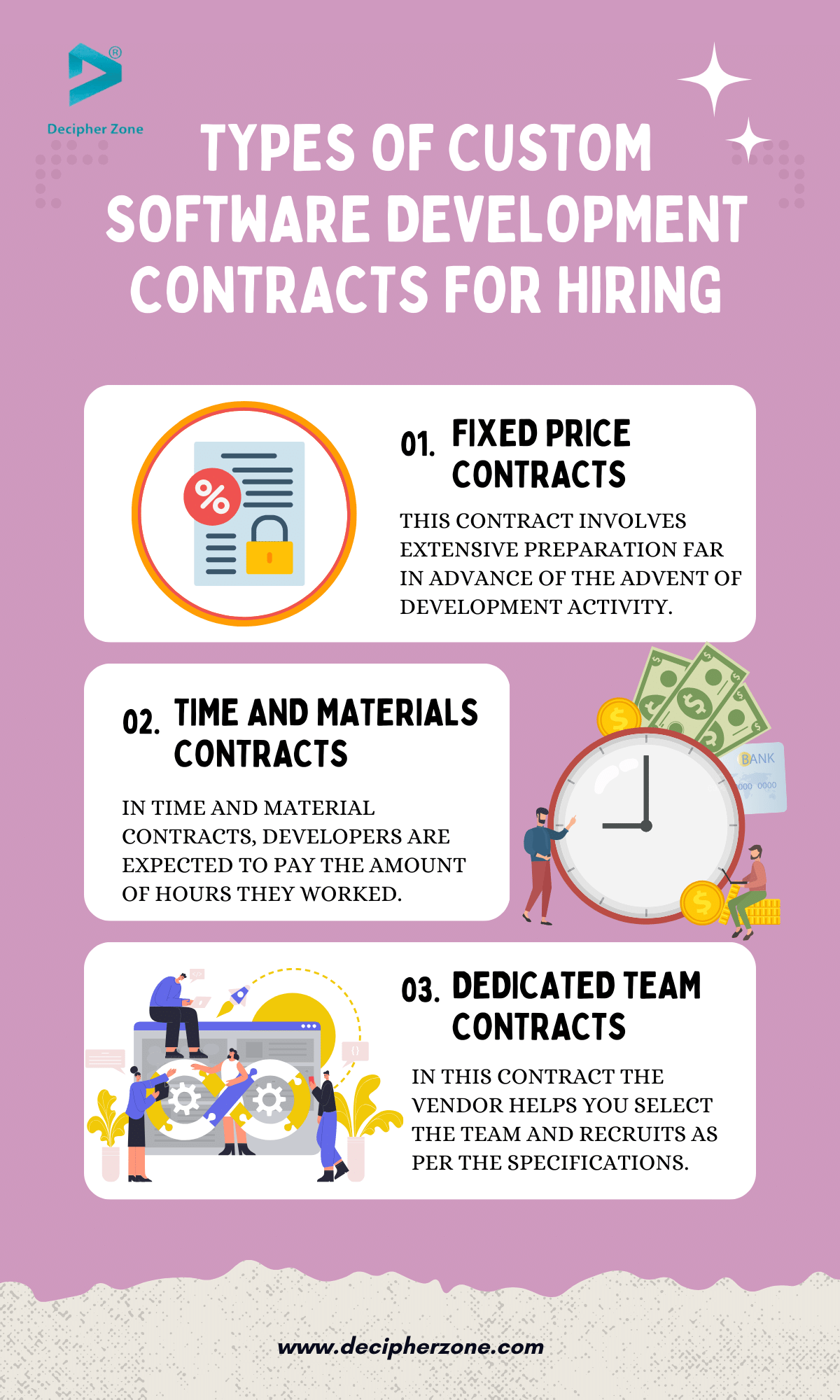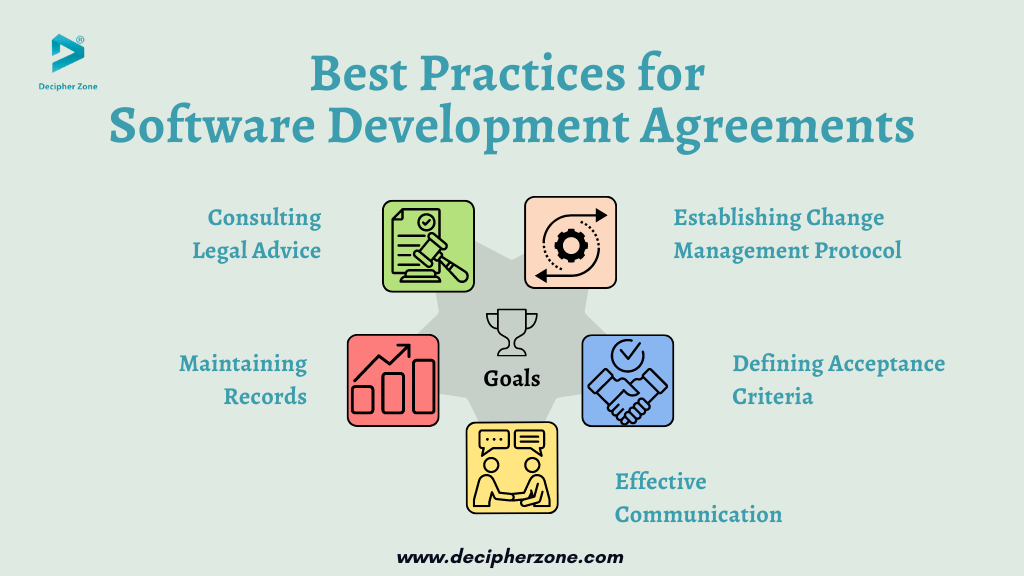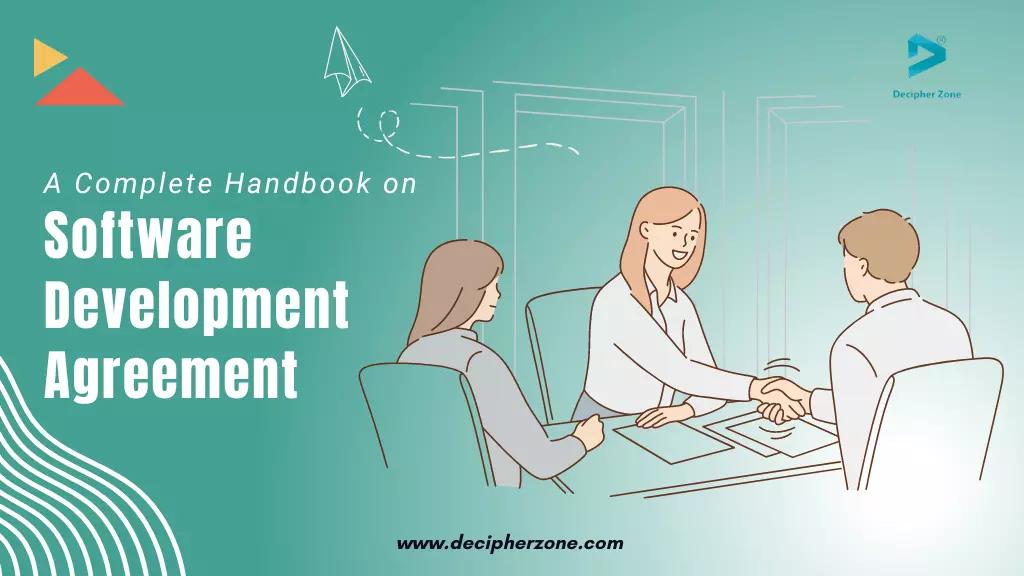The Software Development Agreement outlines the key features of the software, the expected timeline for development, the cost involved, and the ownership rights of the final product. For a comprehensive understanding of its advantages, key elements, types, essential clauses, and best practices, delve into the following article.
Clients need to understand the maintenance and development processes involved when they outsource a software development company to bring their project vision into reality. Having a Software Development Agreement in place can help clarify expectations and resolve any conflicts that may arise.
Additionally, with the expected growth in income from software development, reaching $858 billion by 2028 according to Statista, businesses can benefit from automating internal and external activities and ensuring secure and well-documented projects through these agreements. This brings us to briefly explore all the aspects of the Software Development Agreement.
What is a Software Development Agreement?
A Software Development Agreement is a legally binding contract that establishes commitments between a client and a software development company regarding a software project. It can also cover agreements between the client and dedicated software developers.
Read: Top 12 Skills A Software Developer Should Have
This document lays out the program's functionality, estimated development time, associated costs, and ownership of the finished product. It also encompasses recruiting procedures, payment timelines, and completion targets for software projects. The software contract addresses inquiries about intellectual property rights, maintenance, support, and source codes.
Additionally, it includes clauses concerning legislation, dispute settlement, and contract termination upon material violation. These clauses are crucial for preventing miscommunications and disagreements between the parties involved in the software project.
Benefits of a Software Development Agreement?
When considering outsourcing software development, a well-crafted software development agreement offers advantages to both the client and the software provider:
For the Client:
1. Offers clear insight and reliable forecasts.
2. Safeguards product ownership.
3. Assists in controlling project scale and expenditure.
For the Software Provider:
1. Precisely outlines scope, deadlines, and resource needs.
2. Guides project planning.
3. Establishes project success parameters and cost estimation.
Major Components of a Software Development Contract
Below are some essential components of the software development agreement to keep in mind:
Comprehending the Project of Work
It outlines the precise duties, specifications, functions, deliverables, and any scope exclusions or constraints for the software development project. The procedure of making a contract aids in defining the client's role and obligations throughout the process of development.
Defining the Time Frame and Cost
When paying for software development services, it's important to choose a contract that clearly outlines the project scope, completion date, and cost. The software development contract should also define the development stages, incremental benchmarks, and the obligations of all parties involved.
The contract includes whether partial payments will be issued at certain milestones. To ensure that everyone agrees, the contract should specify the payment schedules in detail.
Liabilities and Warranties
This element in a software development agreement deals with commitments about functionality, quality, and adherence to the law. This section outlines the rights and duties of the customer and the software development business, which should be carefully reviewed and negotiated by both parties to safeguard their respective interests.
Intellectual Property Rights (IPR)
Ownership of the source code is closely tied to intellectual property rights (IPR). Service providers may withhold the source code or IPR until final payment. Payment terms for software development are linked to IPR, and mutual consent is needed to designate a project manager from your company as the source code owner. Clear legal protection is crucial for safeguarding trade secrets.
Confidentiality Agreements
Under this component of the software development agreement, all parties agree to keep certain information private both during and after the project, including business ideas, trade secrets, client information, and personal data.
Confidentiality agreements have to specify what data is private, how it will be kept safe, who may access it, and how long. Software development confidentiality agreements should include exclusions for disclosures mandated by law or approved by both parties.
Adaptation and Progression
The software development agreement includes a provision stating that the contract will remain enforceable even if the vendor's services are terminated or if the project is completed. The terms and conditions of the entire agreement will continue to be in effect, regardless of whoever takes over the project or replaces the vendor or the customer.
Read: Top 9 Best Software Development Models
Assistance and Maintenance
This component outlines the software development company's ongoing support and maintenance services for the customer, including duties and conditions related to post-development services such as software maintenance.
Types of Custom Software Development Contracts for Hiring
When it comes to choosing a business model, the options can feel endless. However, some models have risen to the top as the most popular and widely used. Check them out below:

Fixed Price Contracts
Fixed-cost contracts involve extensive preparation far in advance of the commencement of development activity. The cost of the contract is set before the project begins. For the estimates to be reliable, companies must have well-defined development scope, conditions, and timelines. Fixed-cost software contracts are straightforward; you pay for the outcome upfront and ideally don't have anything left for further payments.
This agreement is appropriate if
-
Your budget is limited.
-
You possess enough and comprehensible project documentation.
-
You are familiar with the technology, or the program just needs minor adjustments.
-
Your project is modest and will be finished in a matter of months.
Time and Materials Contracts
In time and material contracts, developers are expected to pay the amount of hours they worked. This type is taken into consideration when it’s more difficult to estimate the budget and time. For instance, if you need to modify the project's scope. This implies that you will have to put in more administrative work and time, and the project may take longer and be paid more.
Consider this type, when:
-
Your budget is versatile.
-
You lack comprehensive and clear documentation on the capabilities.
-
You're responsive to suggestions and ideas from the developer
-
You're prepared to give the project all your effort.
-
Your project is modest and will finish in a matter of weeks.
Dedicated Team Contracts
In software development, dedicated teams are utilized for long-term cooperation. The vendor assists in team selection and recruits based on specific requirements. While you are responsible for paying the vendor's fee and team salaries, this approach offers flexibility and benefits for extended projects.
Moreover, a designated weekly or monthly budget could be specified, and out of the three types of software service contracts, the dedicated team contract is often the most adaptable.
Read: Most Popular Types of Software Development
You may find it advantageous to assemble a dedicated team if:
-
Your budget is versatile.
-
You lack documentation and need non-standard software functionality.
-
You require a full-time group.
-
You're prepared to give the project all your commitment.
-
You've been working on a big project for an extended period of time.
Essential Clauses of the Software Development Agreement
Comprehensive clauses are integral to a well-crafted software development agreement as they help foster a smooth working relationship between the parties involved. Below are some essential clauses discussed:
Intellectual Property Rights
Creating software from scratch entails creating a product that did not exist before. This raises the issue of the ownership of the product. While it is standard procedure for the client to retain ownership and all other rights to the program, having a strong provision in this respect would assist prevent the developer from making unjustified future claims.
Source Code Escrow
In software development, escrow refers to placing the source code in the hands of a reliable third party. Source code escrow enables the client to guarantee that the code does not disappear along with the developer in the unlikely event that they are unable to assist. It is also essential for the software's ongoing maintenance and support. This provision will also protect the client from any jeopardy if they decide to work with a different developer.
Confidentiality
This clause outlines the specific details that are to be kept confidential, even after the agreement or contract has ended or achieved its intended objective.
Testing
In this clause, Developers are intended to conduct multiple rounds of testing to ensure completeness and top-notch quality. The clause also includes the specific testing criteria and conditions in the software development where the software development contract can help manage expectations and assure successful software delivery.
These provisions are unique to technology agreements, such as software development contracts. Yet, without the standard terms, these clauses alone are insufficient to establish a valid agreement. The key phrases are:
-
Consideration
-
Disputes Resolution
-
Guarantees and Advocacy
-
Term and Termination
-
Notices
-
Governing law and jurisdiction
-
Boilerplate clauses
Best Practices for Software Development Agreements
It's essential to follow best practices for software development agreements to ensure that projects run smoothly, minimize risks, and safeguard all parties involved in the contract.

-
Consulting Legal Advice- In software development contracts, it's important to consider seeking legal counsel to safeguard the rights of both the client and the software provider.
-
Maintaining Records- Maintaining proper documentation is crucial including the scope of the project, modifications, communication, and milestones.
-
Effective Communication- Maintaining effective communication establishes openness and transparency between the parties. This promotes clarity and minimizes misunderstandings.
-
Defining Acceptance Criteria- To guarantee that the finished product satisfies the client's needs and quality standards, it is helpful to define the software's acceptance criteria in detail. The parties need to communicate to have a mutual understanding of the expectations for the product and the standards by which it will be judged.
-
Establishing Change Management Protocol- To effectively manage modifications, additions, or alterations, it's important to implement change management protocols. Both parties should document, evaluate, and approve any changes to stay informed and ensure proper communication. Proper documentation ensures that all involved parties are informed of any adjustments and can appropriately modify their expectations.
Read: Software Development Challenges and Solutions
Bottom Line!
With a solid software development contract in hand, you will be better set up for project success. A well-crafted software development contract can safeguard the parties involved from losses or any unwanted situation. You can rely on us if you’re not ready to go through contract drafting on your own. At Decipher Zone, our experts can guide you through the entire journey, from the initial stage of software development and drafting a proper software development contract to running a remote team.
FAQs
-
Why do I need a software development agreement?
A software development agreement is important for setting expectations, protecting both parties and reducing potential threats. It gives the project structure, outlines roles, and helps with avoiding miscommunications or conflicts down the road.
-
Can I modify the software development contract to suit my project needs?
When it comes to software development agreements, it's important to have a contract that aligns with your project requirements. At Decipher Zone, we prioritize our client's requirements and gather all relevant information to ensure that the agreement reflects your specific requirements. We work collaboratively with you to incorporate the terms and clauses that are important to your project.
-
What happens if there are changes to the project scope?
To address any change you are required to make a formal change request process in the software development agreement ensuring transparency and accountability.

